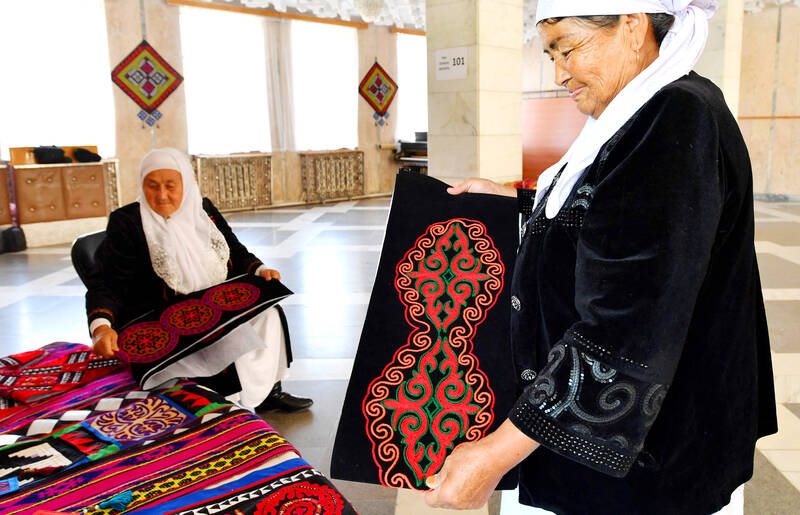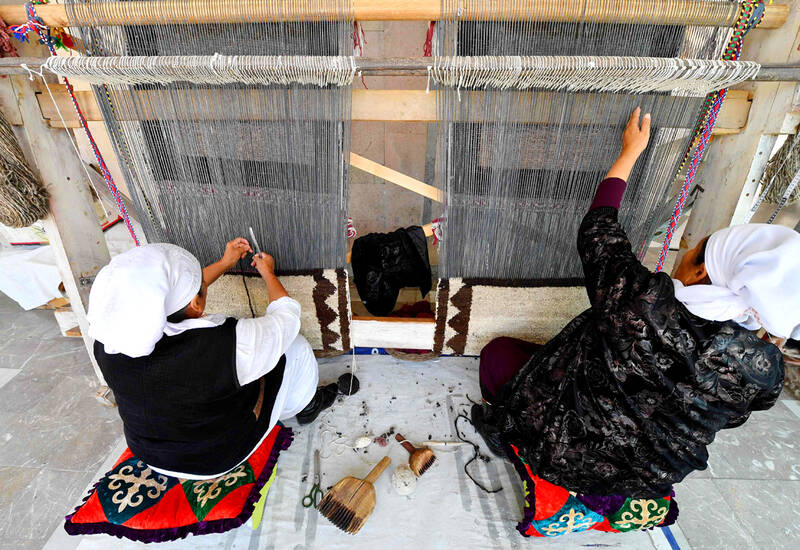Tashkan Khakimova, 77, crouched over a wooden weaving machine, wool speeding through her fingers, using a traditional rug-making technique in Kyrgyzstan’s remote mountainous region of Batken.
A young schoolgirl held the remaining wool next to Khakimova, dressed in a white headscarf and a velvet jacket with traditional embroidery on it. After several hundred hours of work, the wool will be transformed into a shyrdak: a traditional Kyrgyz rug.
Khakimova is one of a shrinking number of mostly elderly people living in the Central Asian country’s mountainous areas who know how to make a shyrdak. Many worry the ancient art will die out.

Photo: AFP
“Our parents taught us the technique, but people are forgetting it,” Khakimova said. She is part of a group of older women calling themselves the “Happy Grandmas” who meet in the small town of Kadamjay. nestled between the Alay mountains, to preserve the endangered craft and boost their meager pensions.
UNESCO has warned that the skill of making the unique rugs is “in need of urgent safeguarding,” with an abundance of synthetic carpets and the young being mostly disinterested.
The “Happy Grandmas” have a mission: to attract Kadamjay’s youngsters to learn the ancient technique. The group of around 20 women meet several times a week in the local Soviet-era house of culture, encouraging school children to learn how to weave.

Photo: AFP
“We come here so that this craft can be passed on from generation to generation, to teach it to young people,” Khakimova said.
Rakhat Dzhoroyeva, another woman in the group, said it was important to preserve the rugs as “these are customs that we inherited from our ancestors.”
“We don’t want to sit at home with our arms crossed,” she said. “We decided to continue the tradition.”
The women use wool from their own animals to make the rugs.
“Production costs nothing,” Dzhoroyeva said, adding that wool is collected from cattle, sheep and goats and “nothing goes to waste.”
She energetically lifts threads with a comb to strengthen the knots of the brown carpet she is making. The shyrdak will then be decorated with colorful traditional patterns recalling the nomadic culture of the Kyrgyz people, before being cut out and quilted to make it more resistant.
The pensioners meet at the “House of Culture of the Metallurgists” of Kadamjay — a city built in the 1930s around a huge metals factory that is now shut down. Hoping to “attract the young,” the women take center stage in the building, with their traditional singing reverberating around the marble hall.
Curious schoolgirls walk past, with a six-year-old soon crouching down to examine the work done by the retirees.
Living in Kyrgyzstan’s poorest region, the “Happy Grandmas” also hope selling the home-made rugs will boost their pensions.
“I get around 6,000 som in pension (around US$67 a month),” Saliya Bozhoyeva, another woman in the group, said. “We can sell rugs for several hundred euros, it allows me to compensate (for) my pension.”
The rusty, abandoned metals factory — which used to employ many of the women — towers over Kadamjay. Its bankruptcy has led to unemployment and an exodus of the working population.
“My husband and I used to work at the factory, but today young people are forced to look elsewhere,” Khakimova said.
Like many families in Kyrgyzstan, her children have gone to Russia — a traditional place of employment for Central Asians — to look for work.
But the “Happy Grandmas” have some hope: there has been a renewed interest in traditional Kyrgyz carpets. Easing tensions with neighboring Uzbekistan have raised the possibility of attracting tourists to this remote region and the chance to strengthen the local economy — with some orders even coming from abroad.
“We have a lot of orders, mainly from Bishkek,” Dzhoroyeva said.
She added, joyfully: “And soon, we will send a rug to Japan.”

That US assistance was a model for Taiwan’s spectacular development success was early recognized by policymakers and analysts. In a report to the US Congress for the fiscal year 1962, former President John F. Kennedy noted Taiwan’s “rapid economic growth,” was “producing a substantial net gain in living.” Kennedy had a stake in Taiwan’s achievements and the US’ official development assistance (ODA) in general: In September 1961, his entreaty to make the 1960s a “decade of development,” and an accompanying proposal for dedicated legislation to this end, had been formalized by congressional passage of the Foreign Assistance Act. Two

Despite the intense sunshine, we were hardly breaking a sweat as we cruised along the flat, dedicated bike lane, well protected from the heat by a canopy of trees. The electric assist on the bikes likely made a difference, too. Far removed from the bustle and noise of the Taichung traffic, we admired the serene rural scenery, making our way over rivers, alongside rice paddies and through pear orchards. Our route for the day covered two bike paths that connect in Fengyuan District (豐原) and are best done together. The Hou-Feng Bike Path (后豐鐵馬道) runs southward from Houli District (后里) while the

On March 13 President William Lai (賴清德) gave a national security speech noting the 20th year since the passing of China’s Anti-Secession Law (反分裂國家法) in March 2005 that laid the legal groundwork for an invasion of Taiwan. That law, and other subsequent ones, are merely political theater created by the Chinese Communist Party (CCP) to have something to point to so they can claim “we have to do it, it is the law.” The president’s speech was somber and said: “By its actions, China already satisfies the definition of a ‘foreign hostile force’ as provided in the Anti-Infiltration Act, which unlike

Mirror mirror on the wall, what’s the fairest Disney live-action remake of them all? Wait, mirror. Hold on a second. Maybe choosing from the likes of Alice in Wonderland (2010), Mulan (2020) and The Lion King (2019) isn’t such a good idea. Mirror, on second thought, what’s on Netflix? Even the most devoted fans would have to acknowledge that these have not been the most illustrious illustrations of Disney magic. At their best (Pete’s Dragon? Cinderella?) they breathe life into old classics that could use a little updating. At their worst, well, blue Will Smith. Given the rapacious rate of remakes in modern